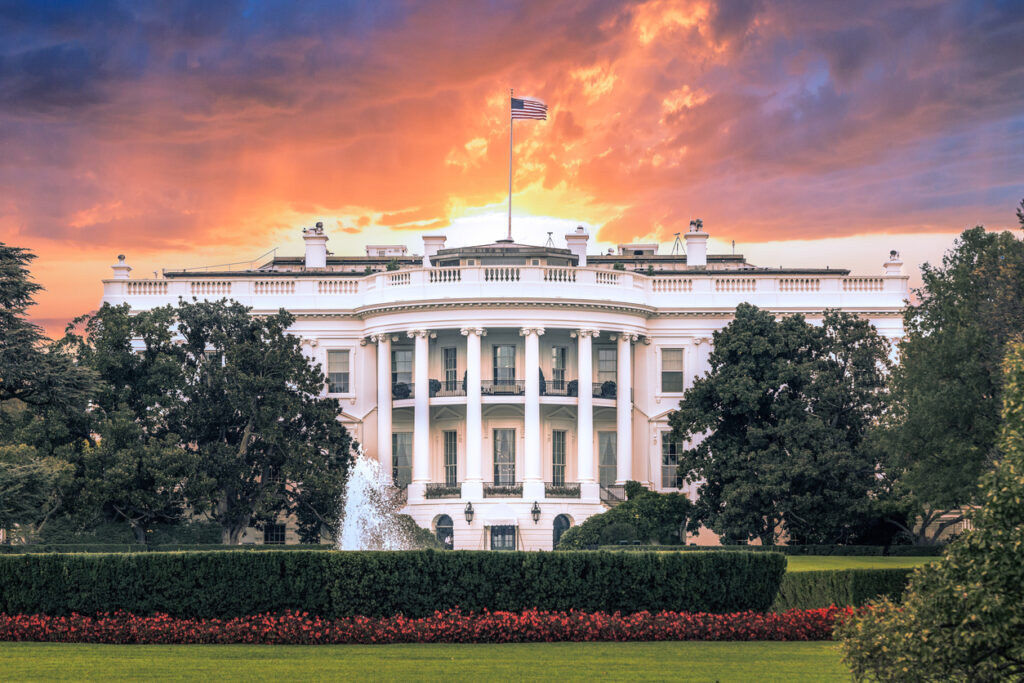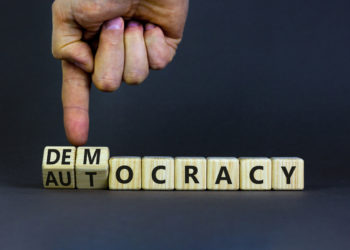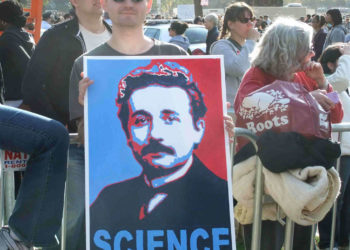In just one week of the new US presidential administration, a flurry of announcements poses potential disruptions and challenges to scholarly publishing and research communications. From the removal of many US inspectors general and a communications freeze on the Health & Human Services division to the discontinuation of DEI programs and climate goals, The Scholarly Kitchen will address these changes as we sort out their implications for our communities.
Here we’ve asked the Chefs to weigh in on the policy changes, but would love to hear more from the community for a future post (or posts!). We’d like to hear your take on new developments with an eye toward the following questions:
- What do you think the impacts of this news will have on your organization?
- How do you see this impacting the landscape of scholarly publishing long-term?
- What is your hope for the future, or recommendations for how our community might respond?
If you’re interested, just send us an email…

Re: Mandates from the US Office of Science and Technology Policy
Rick Anderson
The ascendancy of a Republican president, in itself, has cast a shadow of uncertainty over the fate of the Nelson Memo (no longer available at the White House website, but archived here), which requires that articles and data resulting from federally funded research be made publicly available immediately upon publication. Would the Office of Science and Technology Policy (OSTP) in a Republican White House have the same enthusiasm for public access to the results of publicly-funded research as it did under the Obama and Biden administrations? If not, would the new leadership care enough about the issue to rescind or rewrite the current version of the memo? (Remember: the Nelson Memo is itself a rewrite of the Obama-era Holdren Memo.) Amid the chaos of firings, program shutdowns, and communication blackouts imposed by the Trump administration as soon as he took office, the current vibe does not seem propitious. But it’s still too soon, and this president’s style is too chaotic, for the tea leaves to be telling us anything very clear yet. On the one hand, it seems vanishingly unlikely that if it were starting from scratch, a Trump OSTP would issue anything like the Holdren or Nelson Memos. But it’s not starting from scratch, and the Nelson Memo has already been issued and had a significant (though not yet comprehensive) impact on funder requirements. Even assuming that public-access guidance isn’t to Trump’s liking, how likely is it that this particular item will become a significant blip on his administration’s radar in the foreseeable future?
One thing we do know: the identity of the person Trump has nominated to lead his OSTP. It’s his former technology staffer Michael Kratsios, who will reportedly work alongside computer scientist Lynn Parker under the leadership of venture capitalist David Sacks, whom Trump has appointed as his AI and Crypto Czar. Kratsios has worked in the past as chief of staff for Peter Thiel, the noted libertarian activist, entrepreneur, and venture capitalist. Does any of this help us read the future of public access to federally-funded research results? I’m not sure. For one thing, this OSTP will clearly be focusing tightly on issues related to AI; there’s a good chance that questions about whether and how the public can read scientific publications will seem to them like a distraction from bigger things. On the other hand, this president’s appetite for dismantling the policies of his liberal predecessors seems to be bottomless, and rescission of the Nelson Memo would take little more than the stroke of his big black Sharpie. On the other other hand, an OSTP leadership with a strongly libertarian bent might like the idea of empowering citizens with scientific knowledge – or hate the idea of telling researchers how to publish. I hate to lapse into journalistic “remains to be seen” boilerplate language, but… any number of things could happen with this new administration. What Trump’s particular set of loves, aversions, and obsessions will lead to in the case of public access remains to be seen.
Re: Discontinuation of Diversity, Equity, Inclusion, and Accessibility Programs
Lettie Y. Conrad
Due to the new US Presidential administration, and the rapid changes underway to remake the government in its image, the last few weeks have been far from business as usual for our community, among many others around the world.
I’m particularly gutted, although I cannot claim to be surprised, by the sweeping discontinuation of policies and resources for diversity, equity, inclusion, and accessibility (DEIA) programs in government, education, research, and beyond. Trump is, after all, fulfilling campaign promises at lightning speed. Sadly, we now live in a time when justice and compassion are classified as “radical…illegal and immoral,” at least by the slim, prevailing majority that has assumed power in the United States.
DEIA programming has been deemed an “immense public waste and shameful discrimination” by those who are most comfortable within a nationalistic platform that promotes a traditional, racist, and patriarchal paradigm. Reading between the lines, this executive order is an attempt to enforce an anti-science agenda and to effectively undermine and defund higher education as a whole. Riding the wave of anti-’elistism,’ this order attempts to deliver on the administration’s white supremacist agenda.
Of course, given the administration’s favorite strategy of sowing chaos and confusion, any of these orders could change tomorrow. However, the intended chilling effect in higher education and research communities has already taken hold. DEIA webpages are disappearing, meetings are being canceled, and faculty are being asked to keep quiet or, worse, remove any mention of DEIA efforts on their profiles. The risks we run without DEIA programs are immense for our community — at worst, this results in blatant censorship; at best, gutting important research efforts and outputs, draining intellectual capital and richness, promoting injustices and harm to many constituencies, as well as countless other ripple effects we have yet to realize.
How best to respond? Shall we hold steady and await more emergency injunctions? Recruit alternate funding sources to float these programs for 4+ years? How can we support our organizations to be brave in the face of a presidential bully? How can we support one another to weather the barrage of intimidation and destructive policies that are yet to come?
By far, the answers to these questions are murky and anxiety-ridden. Personally, I plan to employ a strategy of calm, focused, and unrelenting resistance. I will keep up my daily efforts to deliver accessible products and services with human-centric design and other methods of iteratively counterbalancing our baser instincts of bias and fear — because I believe Marget Mead’s words: “Never doubt that a small group of thoughtful committed individuals can change the world. In fact, it’s the only thing that ever has.”
Re: Leadership Lost in Evidence-led Environmental Action Space
Haseeb Irfanullah
Working in the environment sector over the past 26 years, particularly on biodiversity conservation and climate change, I’ve noticed some interesting shifts in the US’s environmental funding in countries like Bangladesh (my country). Since the 1990s, the US Government, through USAID, has been a consistent funder of protecting and sustainably managing natural resources. Just after the turn of this century, the US became a strong supporter of the ‘co-management approach’ (an inclusive governance system involving people from all walks of life) in biodiversity-rich areas protected by Bangladesh’s laws. Irrespective of who was in the White House, such support continued (e.g., Ecosystem/Protibesh Activity), until last week. But, conducting research and creating new evidence of what worked and what didn’t in environment projects, and documenting them for public access were limited in USAID projects, despite some having commendable levels of funding (up to US$ 37 million). We have seen a few outputs at the end of a project (e.g., CREL Activity), but I was not quite aware of how they would feed into improving the US’s or its partners’ (here Bangladesh) policies, planning processes, or program execution.
Since 2022, I have been closely following how methodologically sound assessments and studies are directly supporting changes. In that year, for example, the USAID Mission in Bangladesh launched a COVID impact assessment of 11 sectors. I led the assessment of natural resource management, climate change & disaster management, and energy sectors. This study prompted USAID to update its Country Development Cooperation Strategy (CDCS, 2020-2027) for Bangladesh in May 2023. Climate change became quite prominent in that new edition. This brings us to my second example. In early 2023, Bangladesh became the first country to host a study under the Climate Adaptation Support Activity (CASA), a new USAID-supported global program. This assessment guided the agency to design and launch its first-ever exclusively climate change-focused project in Bangladesh in July 2024. In the first week of this year, I got very excited seeing a biodiversity assessment report on Bangladesh published. My excitement wasn’t only because I was on the study team, but also knowing that this report will be ‘the’ biodiversity document to consult before designing any environmental plans or projects in Bangladesh over the next few years. And this comprehensive output was only possible under USAID’s global Improving Design, Evidence and Learning (IDEAL) Activity.
The Stop-Work Order disappoints me as a development facilitator who also works in the research communication space. It seems to me the research-policy-environment nexus the US Government has started to build over the last few years will be seriously hurt at four different levels. First, even after reevaluating and realigning US’s Foreign Aid policy, given the chaos the Order has already created around the globe, I think evidence-guided actions will be deprioritized in policy-project development. As a result, we may start seeing politically motivated environmental actions, as we often see in the Global South. Second, the US’s development agenda will not have any climate change-related actions. And, it will be happening by blatantly ignoring overwhelming scientific evidence that says climate change is an existential threat to humans. Third, I don’t see any current global players (e.g., the Nordics, the Brits, the Germans, or the French) single-handedly leading the research-policy-environment space after the US’s departure. Will China be (or want to be) a prominent actor in this arena? I doubt it. And, my last concern is if, following the US example, we will see a domino effect across the world jeopardizing the role of knowledge in decision making altogether.
Re: Fear, Uncertainty, and Doubt about US Federally-Funded Research
Alice Meadows
In less than 10 days (at the time of writing), the new Trump administration has caused more havoc and chaos than any other US government in my lifetime — and it keeps coming. Just in our own scholarly communications/scholarly publishing neck of the woods — and just in the couple of days since I started this post — we’ve been told (among other things) that funding applications for National Science Foundation (NSF) grants have been paused (following a similar announcement from the Department of Health & Human Services (HHS), announced last week); that all funding, loans, and communications for both departments have been paused; and (as of January 28) that all funding and loans for all departments would be paused. As is often the case, the language used in this slew of orders is so broad that it’s unclear what is and isn’t permitted.
A judge temporarily blocked the freeze on federal funding and – literally minutes after I thought I’d finished this post! – it was rescinded — sort of. While we may have dodged a bullet, for now at least, other threats to research and scholarly communications remain. For example, we know that the administration is seeking to terminate “equity-related” grants or contracts, which would adversely impact research across all disciplines and institutions.
More uncertainty is inevitable, and it’s never good for business – or morale. As Mike Boylan-Kolchin, a theoretical astrophysicist at the University of Texas at Austin, notes in Nature: “A pause is not ‘everything gets frozen in time and just unthaws immediately’. There are a lot of moving parts, and this is grinding them all to a stop, and it’s unclear how it gets started again.” So, even though the federal funding freeze is lifted (for now), the impacts of this chaos will continue to be felt for months if not years, at all levels – individual, organizational, state, national, and international. Trust is hard to earn and easy to lose; the likely loss of trust in US-funded research may prove to be the most devastating and long-lasting result of the Trump administration’s actions in this area.
It’s hard not to feel anxious and depressed about everything that’s happening – especially given the speed at which it’s happening. However, every threat also represents an opportunity. In this case, the opportunity is for the individuals and organizations that work in the research ecosystem to put aside their differences and focus on a common goal – to ensure that high-quality research continues to be funded, conducted, reviewed, published, and disseminated. Now is the time for funders, institutions, and publishers of all shapes and sizes to come together to protect and support the work of the researchers they serve. I’d love to see industry organizations like the Association of Research Libraries, the Association of American Universities, and the STM Association joining forces to tackle this crisis in concrete ways. Who knows, maybe these conversations are already happening – I hope so! If not, then now’s the time to start them…
Discussion
6 Thoughts on "Ask the Chefs: Making Sense of Changing US Policies"
Two weeks now since CDC was permitted to issue MMWR. The first break since publication started in the 1960’s. The DoD equivalent MSMR is still being published for now. Waiting for them EO ordering publicly funded information be moved behind paywalls, if it’s being counted & collated at all. Evidence based Science is in existential crisis because of these malefactors.
I wouldn’t deign to predict anything this administration might do, but this excerpt struck me as I was reading: “an OSTP leadership with a strongly libertarian bent might like the idea of empowering citizens with scientific knowledge”. My impression has been that Trump’s endgame is absolute authoritarian power and what better way to get there than a largely ignorant population. I do believe keeping primary research out of the hands of the public–among other forms of censorship, as we’ve seen in history–seems a logical path. But logic is barely at play so…. who knows!
My concern is that the new administration will limit research to approved areas and seek to eliminate funding for subjects where it might not like the results. I’m passionate about 1st amendment rights. I fear any attempts to reduce funding for any studies that might be critical of religion or support conclusions that disprove the evil consequences of “immoral” acts. Another example would be not approving any research that might focus on the advantages of immigration.
On “worrying about limits of research to approved areas”.
You can’t say that the Biden administration didn’t slant its research awards towards more DEI and climate research. They may have overdone the slant, in the voters’ opinions. Now the new administration is overdoing it in the other direction (along with general chaos so far, as they just throw out EOs without clear guidance or analyzing consequences). But funders do pick and choose research areas all the time. We’ll have to see what the new guidance and research funding areas from Federal funding are, when things settle down a bit.
Just announced by the British Association for the Study of America – it’s funding grants from the US Embassy in London have also been impacted this. They stood their ground and refused to concede to changes requested in relation to EDI policies. Times Higher Ed have the story – https://www.timeshighereducation.com/news/uk-researchers-lose-grant-cash-over-trumps-anti-dei-purge and BAAS have put their announcement out here: https://baas.ac.uk/news-and-events/2025/02/cancellation-of-baas-us-embassy-small-grants-programme/



